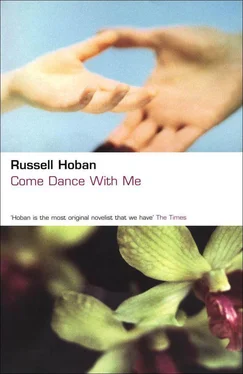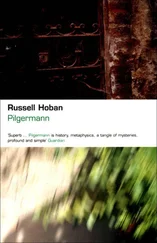‘I don’t want to try someone else,’ he said.
‘What are you looking for?’ I asked him.
‘What am I looking for?’
‘Don’t answer a question by repeating it. What are you looking for with me?’
‘I hadn’t thought it out, Christabel. You started it with that line from “Herr Oluf”; I’m just going from one moment to the next with you and I’ll go as far as it goes.’
‘Brave words. Have you got a video of Vertigo ?’
‘Yes, I have.’
‘Good. After we get out of here let’s go to your place and watch it.’
‘OK, we’ll do that. Any reason for that particular film?’
‘Not really, I just feel like watching it with you.’ We talked some more about Friedrich and Böcklin and Bresdin, had two more pints and coffee, then we left The White Horse and walked to Elias’s place on the other side of Eelbrook Common. Here I was in another January ten years after the one when I lost Django. January weather suits my January mood. I like it when the days are cold and grey and rainy and the nights are early and dark and huddly. The lights on the New King’s Road and on both sides of the common made it seem darker where we were and now it started to rain. Again there was an invisible helicopter near and far, near and far. Behind us the District Line trains rumbled and clacked as shadowy people passed us coming and going on the shining paved paths. Sometimes, I was thinking, everywhere is nowhere and nowhere isn’t a bad place to be.
Elias’s house was enormous, four storeys with a roof extension. ‘Do you live all by yourself in this whole place?’ I asked him.
‘Yes,’ he said. ‘I’m used to being alone with a lot of space around me. And I’m a big accumulator — books, recordings, videos.’
We got out of our wet coats and towelled our heads dry, then we settled down in the ground floor living room and Elias got us some cognac and lit a fire in the fireplace. By now the rain was drumming on the windows and there was a lot of bleak midwinter going on outside but it was big-time cosy where we were. There were shelves full of books catching gleams from the fire, and china and bronze figures taking the shadows and the light. I had the feeling that Elias’s house didn’t look empty when nobody was in it. ‘Here’s to whatever,’ I said as we clinked glasses.
‘I’ll drink to that,’ he said.
‘Roll on Vertigo,’ I said. ‘Let’s get suspenseful.’
‘But you have seen it?’ he said. ‘You know how it ends?’
‘Sure, but each time I see it I hope the end will be different.’
‘So you’re a positive thinker after all.’
‘In a negative way. Are you ready in the projection booth?’
As there may still be one or two people out there who’ve not seen Vertigo, I won’t disclose any more of the plot than I have to. James Stewart plays an ex-cop who had to leave the force because after a disastrous rooftop chase he has a fear of heights and gets dizzy when high up. Knowing this, an old friend hires Stewart to shadow his wife because he says he’s afraid she’s suicidal. This is a hoax that draws Stewart into an elaborate murder plot. Kim Novak is part of it but she and Stewart fall in love with each other, which was not in the plan. When he finds out much later how he’s been duped he becomes bitter and cynical.
I’ve given a lot of thought to the Kim Novak character. She’s got a shady past, she’s definitely a bad-luck woman but she’s touching and vulnerable and beautiful and she’s never stopped loving Stewart. Does she deserve a second chance?
‘There are holes in that plot you could drive a truck through,’ said Elias.
‘I know that,’ I said, ‘but what about the Kim Novak character? If you were in Stewart’s place, would you make her climb the stairs in the old mission?’
‘No, I wouldn’t.’
‘Are you sure? After all, anything with her was going to end up badly one way or another — she was definitely unlucky’
‘How could I reject her? I fell in love with her because of her self, regardless of her part in the hoax. There was a strangeness about her, she seemed a prisoner locked in the mystery of herself — only love could free her and I was still in love with her, never mind how I’d been used, I wouldn’t care about that. Love isn’t a rational thing. I’d never have made her climb those stairs, never.’
‘That’s a very passionate speech. Have you ever been in love, Elias?’
‘Not like that, not irrationally’
‘Pour some more cognac,’ I said, ‘and let’s look at the shapes in the fire.’
23 January 2003. An owl tattoo. Not just any old owl but a beautifully-done copy of a Caspar David Friedrich owl, wings outspread, perched on the little roof of a wooden-cross grave marker. This is the bird I know as a great horned owl; in German it’s called uhu. Spreading its wings across her sacrum. Without thinking I said, ‘Who’s buried there?’
‘Various hopes,’ she said, and began to cry. I took her in my arms and she was shaking all over. I got her into bed and under the duvet and held her while she cried herself out. I felt a fool for saying what I had and I was honoured that she was giving me her naked sobbing. What was she crying about? I wondered. Anything to do with that owl tattoo? What buried hopes did it signify? And it wasn’t like a photograph or a note you can tear up and throw away; it was permanent, following her around for ever.
When her sobbing had died down to whimpers and sniffles she sighed and cuddled closer and fell asleep in my arms. After a while I gently withdrew the arm she was lying on and I fell asleep too. That was the extent of our lovemaking on our first night together.
In the morning she woke up with a smile, hugged me, looked at her watch, and said, ‘I’ve got a recording session.’ She and her owl flew out of bed and into the bathroom, from where she emerged fully dressed in about half a minute.
‘I’ll make us some breakfast,’ I said.
‘No time,’ she said. ‘Phone you later.’ She blew me a kiss and was off down the stairs and away, leaving only the smell of her in my bed. Not a fragrance out of a bottle but her own smell that had in it her nakedness against mine. Not a word about the owl tattoo.
I was still trying to figure out our Vertigo session. It had been some kind of test and I’d passed but I didn’t know why. The Kim Novak character was called Madeleine Elster. Christabel obviously identified strongly with her but again I didn’t know why. Madeleine Elster was unlucky, she’d said. Anything with her was going to end up badly. Was Christabel speaking about herself? She was surrounding herself with a hedge of mysteries and warnings, becoming, intentionally or not, a fairy-tale princess. Naturally I was beginning to feel like the prince who would break through that hedge to rescue her. Had I ever been in love, she wanted to know. Not irrationally, I’d said. But what other way was there to be in love? And was I?
It was Thursday, a working day for me. I thought she might have been a little more forthcoming than that speedy hug and kiss. I didn’t need a certificate of my sensitivity and understanding but there could have been more of … I don’t know. On the other hand, maybe the easy ordinariness of her departure was her way of showing that there was more between us than there’d been before. Yes, I was back at the high-school level of wondering about girls. Would she go to the prom with me? Mustn’t rush things. I sighed and caught an II bus to St Eustace.
It’s an old hospital and it smells old. The flickering fluorescent lighting made the day seem as wintry indoors as out. I took the lift to the third floor and got ready to stick my thumb in the dyke yet again while the flood of diabetes rose higher and the walking statistics briefly abandoned McDonald’s and Pizza Hut and Coca-Cola to present themselves to me. There are of course more young ones than there used to be but most of them are middle-aged or older, some walking unaided, others with sticks or in wheelchairs, all of them unable to metabolise the satisfaction they’re greedy for. As far as I know there is no Sweetaholics Anonymous. And along with their burgers and fries the diabetics are eating up more NHS money all the time. Right now we’re spending ten per cent of our £72 million budget on treating the disease; by 2010 it’ll be twenty per cent. Things change, but always, it seems, for the worse.
Читать дальше












